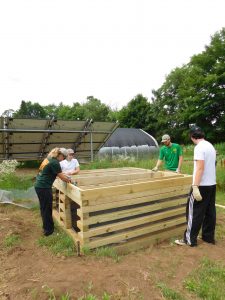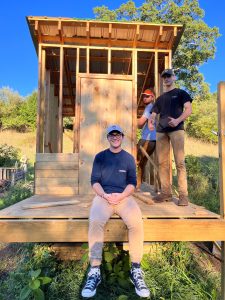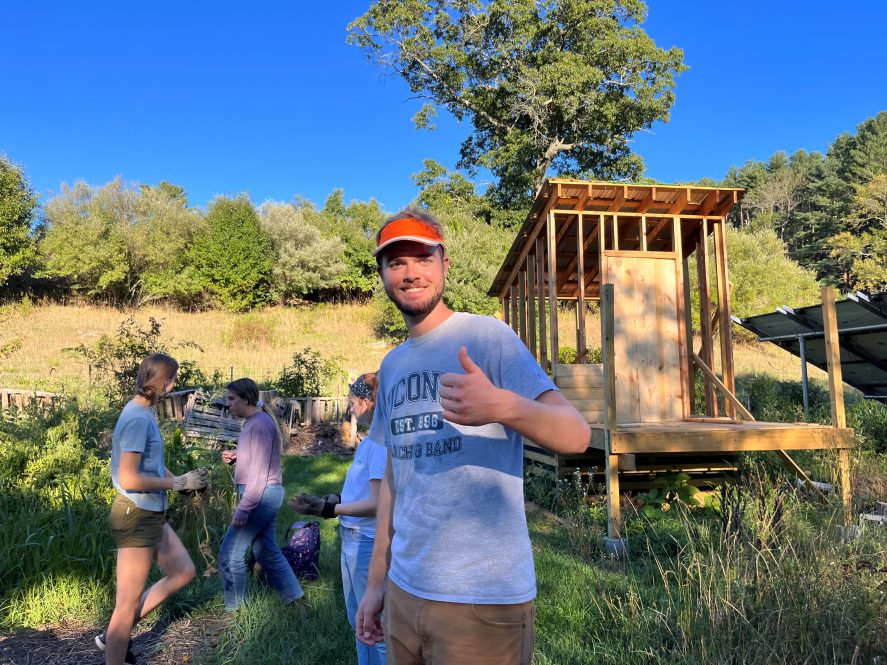For students living and working on UConn’s Spring Valley Student Farm, the experience is immersive and creates opportunities to launch innovative projects. One of those projects currently underway illustrates how the farm is working toward a more sustainable and inclusive experience for everyone who visits.
As an educational farm, SVSF is open to UConn students, faculty, staff, and the public for tours, activities, and events. However, Farm Manager Jessica Larkin-Wells points out one problem – the only bathroom facility they could offer was upstairs in one of the student houses.
Larkin-Wells says that when the farm re-opened in the fall of 2021, it was clear that having as many as 60 people using a single loo presented safety concerns. Something needed to be done and, fortunately, they had the knowledge and resources to address the challenge with a unique and sustainable strategy.
“It was a perfect storm of different people and events colliding and this became the right time to do it,” Larkin-Wells says.

Andrew Muller ‘23 (CAHNR) and Isaac Betts ’23 (CAHNR) are two students currently working at and living on the farm. Muller and Betts are also part of the team adding a legacy to the farm in the form of a composting privy that will be available for all visitors.
Their main objective was to find a sustainable way of processing waste and a composting privy setup has long been a goal for the farm. The timing was even more perfect, because it coincided with the UConn Office of Sustainability in the Institute of the Environment’s Environmental and Social Sustainability Small Grants Program. Student farmers Betts, Muller, and Phoebe Mrozinski ’22 (CLAS) applied and were awarded funding.
“Without that funding, there’s no way we could be doing this right now. We feel very lucky and grateful,” says Larkin-Wells.
The design and use are simple, says Betts. The “throne” sits atop the “crib” underneath, which is made of pressure-treated lengths of four-by-four lumber, stacked log cabin-style to allow airflow. After each visit, the user adds either sawdust or chopped leaves or bark, says Betts.
“In theory, it shouldn’t smell, just like a good compost pile.”
When one side fills up, the throne is moved over to a second crib. Larkin-Wells says this design is becoming standard, and was chosen specifically because it is very low maintenance.
“It’s easy for users and the biggest mistake you can make is dropping trash into it, other than that, you can’t screw it up,” she says. “The design also limits the amount of handling of human waste that anyone will have to do, it was important to factor that in.”
Larkin-Wells says they designed the system to be large enough that they may never have to empty it, but if they do, the compost – often referred to as “humanure” – could be spread on non-food crops such as the pollinator garden.
Muller gained experience with this design after helping to build a similar privy last year when working as a member of a trail crew.
“The design came from the Green Mountain Club, which shares designs with the Forest Service and another trail organization,” says Muller. “Everything that they build must be ADA-compliant because it goes on federal land. The interior needs to be large enough to have certain turning radiuses, with grab bars that are certain distances away from the throne, and the throne must be a certain height. It also has a ramp and a porch so that someone who uses a wheelchair can open the door and get in. This is our first ADA-accessible facility on the farm, so anyone that uses a wheelchair or other mobility aid can enjoy Farm Fridays and other events here on the farm.”

As an educational farm, Larkin-Wells says they are excited to teach visitors of SVSF about the system and get them thinking about sustainable solutions to waste management.
“Currently, most waste management systems in the U.S. require flushing nutrients away with good clean drinking water,” she says. “We’re excited to open conversations about how we can improve at UConn. I’m excited to see how those conversations go, that’s a big part of this project. As we have farm Friday volunteers coming up to start having those conversations with people about what this is, how it works, and how waste is usually processed.”
Much of the wood used in constructing the privy came from the UConn Forest, says Muller, who also works on the UConn Forestry crew. He and Betts also work in the UConn Applied Forest Ecology Lab.
“The UConn Forest had a stand of dead or dying white ash that was infested with the emerald ash borer. This spring, the forest crew went in and cut and cleared about two acres of it and we milled a lot of wood most of which is siding, and for a little bit of the framing. All the siding is what we milled and some of the ramps will be UConn wood as well. The area that the crew cleared will become a chestnut orchard,” says Muller.
The farm is funded by the Department of Dining Services, and students living on the farm commit to 10 hours of farm work a week in exchange for a reduced housing cost, says Larkin-Wells.
Larkin-Wells adds, “We also offer internship and independent study credits for pretty much any UConn students who are interested in plugging into what we’re doing here or doing a project of their own.”
All the food grown on the farm is used by UConn dining halls and cafes, or is sold at the farmer’s market on campus.
“You can see all the work that people have put in and knowing that you are part of that is great,” says Betts. “Living here, we can hang out with sustainability-minded people who are all focused on taking good care of our little piece of land.”
If you are interested in getting involved or learning more, Farm Fridays are back on the schedule from 4-6 pm. Check on the farm’s Instagram or the University Events Calendar for information.



